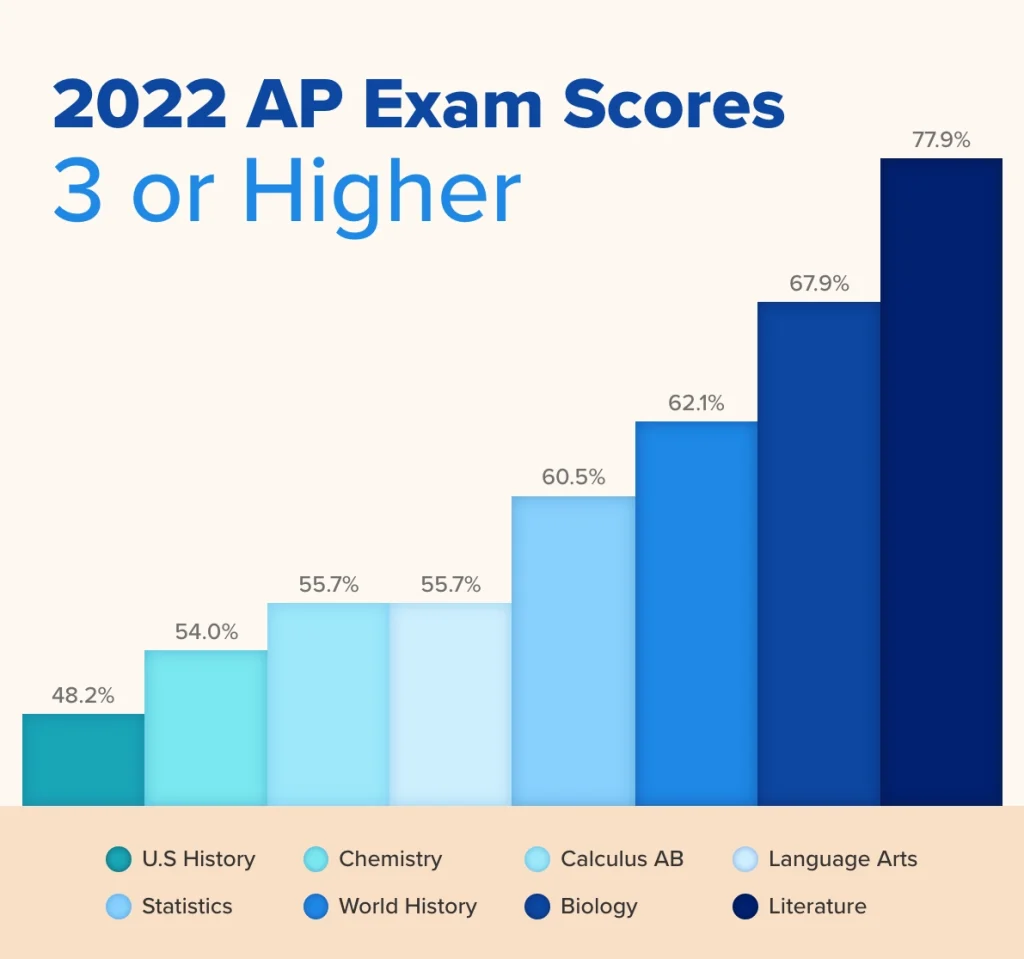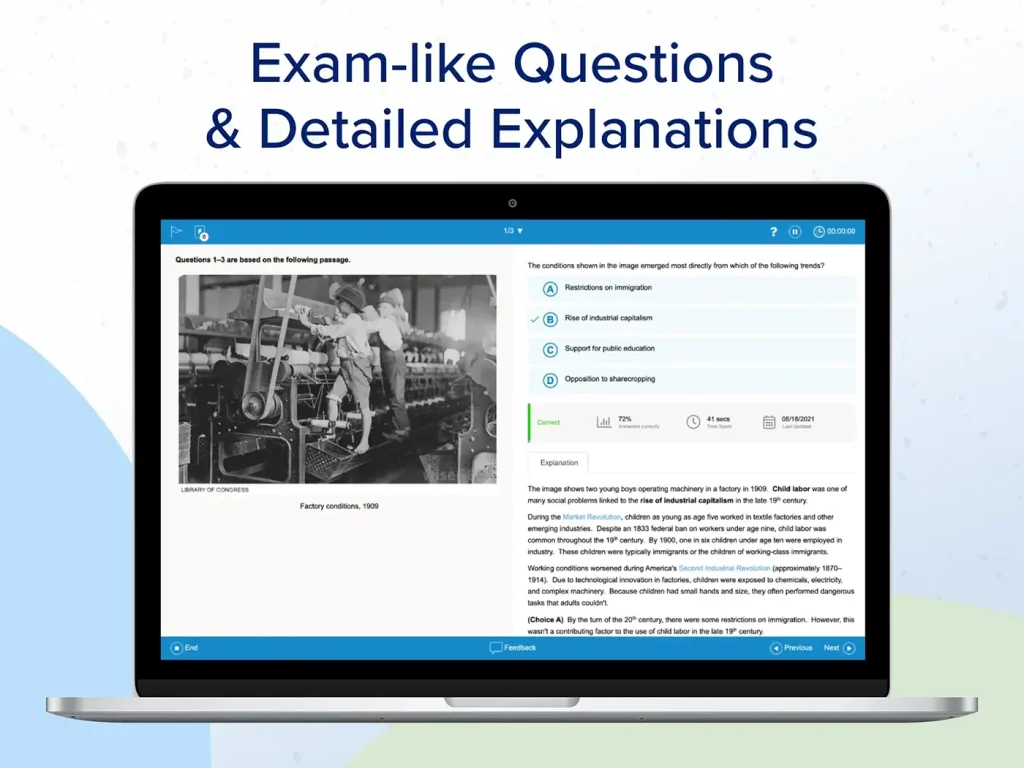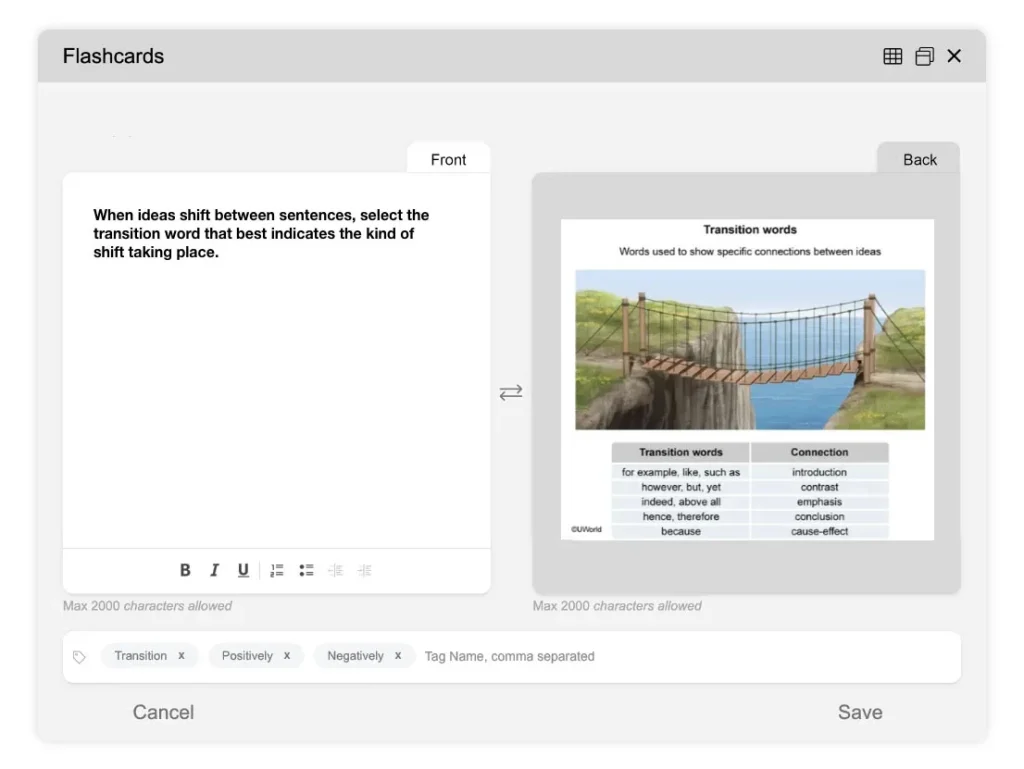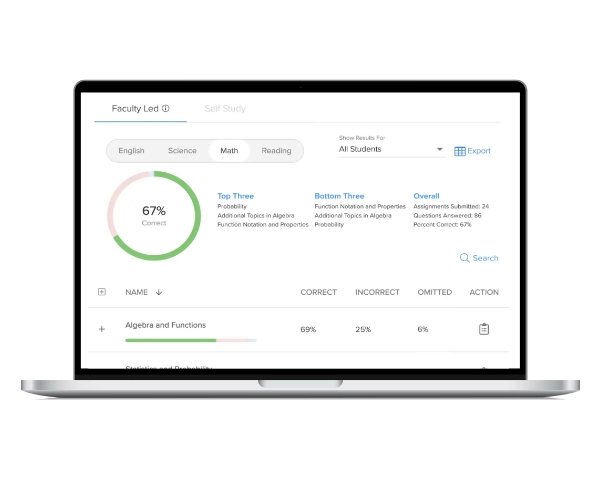When Dr. Martin Luther King Jr. changed history with his recitation of the “I Have a Dream” speech, he didn’t nonchalantly string together some words in hopes of getting his point across. Rather, the night before, King sat alongside his draft speechwriter, Clarence B. Jones, while they carefully prepared the words and details of the address. Later on, it would become one of the most famous speeches of all time.
Even though reviewing for an AP® test is very different from writing a history-making speech, AP English Language and Composition teachers must devote significant time preparing for the weeks leading up to the AP exam. They must carefully consider everything that needs to be covered in a thorough review. This means going over every subject in the course. Because they are aware of how challenging the exam is, AP Language instructors recognize the value of content review. According to the College Board®‘s score distribution report for the 2022 AP exams, just 55.7% of students who took the AP English Language and Composition test passed with the needed score of 3 or higher.1

Student Score Distributions on AP exams (2022)
To give their students the best chance of doing well on the exam, AP Language teachers must carefully prepare for a tough summative review. And to help with that, we’ve provided five ideas that can be incorporated into any content spiraling plan for last-minute AP Language and Composition test preparation.
Tip 1: Break Curriculum Into Smaller, Doable Parts
The primary reason for the last few weeks of test preparation before an exam is to spiral through all of the content units that may be tested. But when there isn’t much time left before a test, it can be difficult to go over everything that needs to be covered to make sure that students are ready for it. A study from the Educational Psychology Review2 found that “chunking,” or dividing study material into manageable chunks, is a more effective test-taking strategy.
Simply put, breaking up information into manageable chunks can help students better understand the subject and, as a result, feel more confident about it. Instead of attempting to cover everything in a single review session, teachers can break apart an AP Language unit or concept into smaller sections and work on each one separately. This improves each student’s memory of what they have learned and allows them to focus on one subject at a time.

Interleaving is another way that AP Language teachers can help their students get ready for the test. This means reviewing several related topics at the same time. Research shows that when teachers “interleave” different subject areas, students learn to tell the difference between topics that seem unrelated and are better able to find and learn from their similarities.2 Teachers can instill confidence in their students and better prepare them for the AP English Language and Composition test by incorporating these test-taking strategies into their lesson plans.
Our choice for an AP Language exam review resource library: Fiveable
Our choice for the best library of resources teachers can use for their AP Language exam review is Fiveable’s free AP English Language Library. It offers a variety of study guides, videos, and slide presentations that are broken down by unit and/or skillset for review.
Why We Chose It:
- Covers all the topics and concepts that are tested in the AP Lang exam
- Includes quizzes, practice questions, and interactive games to reinforce learning
- Features visual aids, infographics, and video lectures to keep learners engaged and interested
- Regularly updated to reflect any changes or updates to the AP Lang exam

Tip 2: Practice With Released Exam Questions
One of the simplest ways teachers can assist their students in preparing for the AP English Language and Composition exam is to allow them to practice with previously released exams. The results will almost certainly improve student scores. According to research from the University of Nebraska-Lincoln3, having students practice with realistic test questions, such as those on released exams, raised scores by an average of 15%. However, test scores only increased by 6% when students studied using questions that were different from those on the actual test.
Our choice for released exam questions: The College Board secure released exams
The best place to get released AP exams is directly from the source, so The College Board is our resource choice for this tip. Students cannot access released AP exams, but AP teachers may use them for practice and review. These tests can also be found in AP Classroom, both directly in the AP Question Bank and with other recently released questions.4 AP Language instructors can find out more about the released exams in the AP Classroom User Guides.
Why We Chose It:
- Since these are actual exam questions from prior years, they can be trusted as an authentic source
- Follow the current format and structure for the AP English Language and Composition exam, including the number of questions, the types of questions, and the time limit
- There are many different question types and topics in the previous exam questions
- Designed to cover a range of difficulty levels, from easy to challenging
Tip 3: Multiple-Choice Practice Makes Perfect
Of course, practicing with multiple-choice questions is a key component of getting ready for the AP Language exam. While spiraling through review material, AP Lang teachers should try to encourage their students to complete at least two multiple-choice questions daily. Students can review important concepts that might be covered on the test with multiple-choice exit tickets or bellringers.
Students can develop the habit of using annotations, focusing on context cues, and discarding obvious incorrect answers by repeatedly practicing with multiple-choice questions. This habit will increase their test-taking efficiency and accuracy. Practice with multiple-choice questions can help students become more adept at time management and more accustomed to the pace of the exam.
Our Choice for Multiple-Choice Practice: UWorld
Our top resource for the best multiple-choice practice is UWorld’s Learning Tools for AP Courses. It’s a great way to incorporate multiple-choice questions into last-minute test preparation for the AP Language exam.
When using UWorld’s multiple-choice questions, students receive excellent explanations. By altering each lesson, adaptive learning technology provides students with practice that is catered to their level of comprehension. Students can use it all year to review what they’ve learned, evaluate their strengths and areas for development, and increase their knowledge and skills in order to be prepared for the AP Language exam. In the final few weeks before the test, it also gives students a quick way to review concepts and practice multiple-choice questions.
Why We Chose It:
- Real-time feedback is given to students, along with a breakdown of the right and wrong answers. By receiving in-depth explanations for AP exams, students can improve their understanding of the underlying concepts and sharpen their problem-solving abilities with the assistance of the feedback
- It offers hundreds of multiple-choice practice questions and thoroughly covers every subject tested on the AP English Language and Composition exam
- Practice questions are timed, which helps students prepare for the AP Language exam’s time restrictions and enables teachers to evaluate their students’ capacity to finish the exam in the allotted time
- allows for the customization of practice sessions by allowing teachers to select specific topics and question types for their students to practice. This makes it possible for teachers to focus their review on the areas in which their students most need help and ensures that they are well-prepared for the test

Tip 4: Greater Understanding With Justifications – Studying for FRQs
Understanding the value of understanding is one of the most notable differences between education today and education a few decades ago. For students to really understand a concept, teachers need to help them figure out why it works instead of just giving them the answer. Giving students plenty of opportunities to justify their responses is important when preparing for the AP Language test. According to a study that was published in the Journal of Computer-Assisted Learning5, students who had to justify their answers to questions had a better understanding of the material than those who were only required to provide answers. A student may comprehend the subject matter better and retain it if written explanations are added to the learning process.
Students will be better prepared for free-response questions if they are required to justify their answers in writing. Providing online examples of excellent FRQ responses will also help students do well on the AP Lang exam. Teachers and students can work together to come up with ideas for FRQ answers by looking at sample questions.
Our choice for additional FRQ practice: APStudy.net
Aside from excellent multiple-choice questions, UWorld also provides a wonderful selection of FRQs for additional practice. For additional FRQ options, however, our pick is APStudy.net. This resource has a large database of free online prompts, sample answers, and scoring rubrics for AP English Language and Composition.
Why We Chose It:
- Offers sample student responses with annotations and feedback from experienced AP English Language and Composition teachers
- Allows students to customize their practice by selecting specific types of prompts or rhetorical strategies to focus on
- Includes scoring rubrics to help students understand how their responses will be evaluated on the actual exam
- Free and easily accessible online resource for additional FRQ practice
Tip 5: Repetition With Flashcards
When reviewing old course material and crucial words, repetition is a fantastic way to ensure that information is remembered. With flashcards, students can actively learn while honing their retrieval abilities, which increases the length of their memory. According to the Central Penn College Learning Center, “Flashcards help students to engage in active recall or a process wherein students actively engage in learning by stimulating our memories and creating lasting connections to the material.”6
When getting their students ready for the AP Language exam, teachers have to cover a wide range of ideas and important vocabulary words. Students will remain engaged and motivated by taking part in flashcard-based exercises while these concepts are being reviewed in class. Flashcards are a useful study tool that can be used by individuals or groups of students. Regular flashcard-based review activities in AP Lang classes can help students remember and understand important course information.
Our recommendation for AP Language flashcards: UWorld
Our top pick for a source of AP Language flashcards is the UWorld flashcards feature. The UWorld flashcards feature is a versatile and useful way for students to review and advance their understanding of the material. They have the option to design their own cards and concentrate on particular course material. It is a good way to study for the AP English Language and Composition exam because it is easy to use and has customizable flashcards.

Teachers can also give students a variety of review assignments that call for the use of paper flashcards. Here are some ideas for how you can use them in your AP English Language and Composition exam preparation.
Put Understanding Before Memorization
Instead of just memorizing information, try to connect it to other concepts to improve your overall understanding of the subject matter.
Make Your Own Flash Card Deck
Making your own flashcards forces you to interact with the material and puts the information in your own words, which helps with memory retention.
Use Words and Pictures on Your Cards
Making connections between the linguistic and visual representations of the information using text and images on your flashcards can help with retention and recall.
Create Fun Review Activities with Flashcards
Playing games or doing other enjoyable activities while reviewing flashcards can make studying more interesting and fun, which can improve retention and foster a more positive attitude toward learning.
Put Understanding Before Memorization
Instead of just memorizing information, try to connect it to other concepts to improve your overall understanding of the subject matter.
Make Your Own Flash Card Deck
Making your own flashcards forces you to interact with the material and puts the information in your own words, which helps with memory retention.
Use Words and Pictures on Your Cards
Making connections between the linguistic and visual representations of the information using text and images on your flashcards can help with retention and recall.
Create Fun Review Activities with Flashcards
Playing games or doing other enjoyable activities while reviewing flashcards can make studying more interesting and fun, which can improve retention and foster a more positive attitude toward learning.
Bonus Tip: Prepare Students with Test Day Reminders
This last piece of advice might seem more like general test-taking guidance than a review for the AP Language exam, but it’s important to go over what students should prepare and bring on exam day. Every year, students forget to bring a pencil, turn off their phones, or show up late for their Advanced Placement exams. However, a study by the College Board7 found that, on average, students who were on time and had everything they needed for their AP exam performed 20 points better than those who were late or had forgotten their supplies. Review a list of all the preparation tasks your students must complete for the AP Language and Literature exam, as well as the supplies they’ll need on test day.
Checklist of Reminders for AP English Language and Composition Students
The Day Before the AP Lang Exam:
Gather all of your materials and get ready for the test
Avoid overstudying for the test
Eat a balanced meal and get plenty of water
Spend some time unwinding and doing stress-relieving activities
Review testing strategies
Verify the exam’s location and start time twice
Set multiple alarms to ensure that you awaken on time
Put a valid photo ID in your bag with the rest of your essentials
Make travel arrangements to the examination location
The Day of the AP Lang Exam:
Bring a pen with dark blue or black ink
Bring a valid photo ID issued by the government
Bring the AP student packet you were given, which contains the AP number label and a demographics sheet
Bring your exam ticket or confirmation of registration with you.
Bring a watch so you can keep an eye on the time
Bring a snack and water with you. These must be left untouched throughout the test and only picked up for breaks
Key Takeaways
Teachers who want to give their students the best content review and test preparation prior to the AP English Language and Composition exam should not underestimate the importance of the final few weeks. The five suggestions in this article can be used by AP Lang teachers to help their students feel more prepared and secure when taking exams.
Learn more about how we strive to support AP educators who want to make a difference in the lives of their students with our Learning Tools for AP Courses.

References
- Student Score Distributions* AP exams – May 2022. (n.d.). Retrieved March 22, 2023, from https://apcentral.collegeboard.org/media/pdf/ap-score-distributions-by-subject-2022.pdf
- Rohrer, D. (2012, July 28). Interleaving helps students distinguish among similar concepts – educational psychology review. SpringerLink. Retrieved March 21, 2023, from https://link.springer.com/article/10.1007/s10648-012-9201-3
- The effects of age and professional expertise on … – Wiley Online Library. (n.d.). Retrieved March 22, 2023, from https://onlinelibrary.wiley.com/doi/abs/10.1002/acp.1467
- Formative assessment. AP For All. (n.d.). Retrieved March 29, 2023, from https://apforallnyc.com/formative-assessment/
- Let me explain! the effects of writing and … – Wiley Online Library. (n.d.). Retrieved March 22, 2023, from https://onlinelibrary.wiley.com/doi/10.1111/jcal.12608
- Libguides: Learning Center – Study Skills: Flashcards. Flashcards – Learning Center – Study Skills – LibGuides at Central Penn College. (n.d.). Retrieved March 22, 2023, from https://guides.centralpenn.edu/c.php?g=695569&p=4999857
- Source: College Board. (2021). AP Exam Score Distributions. Retrieved from https://reports.collegeboard.org/media/pdf/2021-ap-student-score-distributions_1.pdf




